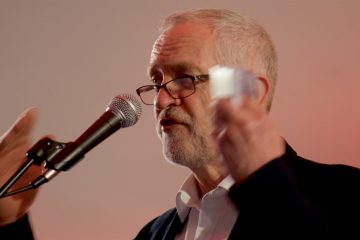
Post-Brexit wave of hate has laid bare the tensions and divisions in Britain
Following the vote to leave the European Union, there has been a sudden upsurge in racist incidents in Britain. The wave of hate has taken many people by surprise, and has laid bare some of the tensions and divisions eating away at the heart of the United Kingdom. It has also called into question Britain’s claim to be a liberal and inclusive multicultural society, leading to considerable soul searching. A state that has often spoken out against identity politics and prejudice abroad is now facing up to the reality that these issues need to be addressed back home. Predictably and understandably, much of the recent commentary as focussed on the divisive referendum campaign and the fact that the UK voted …

Round 4 in the Fight to Keep Corbyn
The Parliamentary Labour Party (PLP) is currently engaged in an ongoing struggle with its leader, Jeremy Corbyn. In a series of exchanges, my colleague, Blake Ewing, and I engage in a debate over whether he should stay or go. Ewing has taken the time to reply to my response to his original piece. There is disagreement between on us on quite a number of fronts, including on our fundamental political commitments. I think the most productive approach, is to summarise what I take to be his three most important arguments and offer my response. So here goes. Ewing disputes my claim over Corbyn’s support in the Labour Party arguing ‘that 81 per cent of his PLP; not to mention all Labour MEPs, hundreds of Councilors, …

A Reply to a Reply: Why Corbyn has to go
Readers of this blog, and especially prospective students in PPE and History and Politics, should see this on-going exchange between my colleague Bruno Leipold, a diehard Corbynista (and expert on Marx), and myself, a defender of what he calls ‘the embittered sliver’ of the Labour Party who want rid of him, as a showcase of the good natured and humoured discourse that goes on here at the university. [You can read my piece here, and his response here.] From time to time we like to talk about so-called ‘real politics’, and why ideas matter. Now, in his article, he describes the only alternative to Corbyn as a ‘coterie of SPADs, PR advisors and Oxford PPE graduates that got Labour into this mess’. But …

Keep Corbyn: A Reply to Alexander Ewing
Last night I attended an emergency local meeting of Momentum (the Labour Party focused organisation set up to defend Jeremy Corbyn’s leadership). More than fifty people crowded into a small meeting room of the South Oxford Community Centre to express their indignation at the actions of the Parliamentary Labour Party (PLP). Like every Momentum meeting I’ve attended, this was done in tones so polite and reserved that you’d have hardly guessed that we were in the midst of the most profound political and constitutional crisis of the country in at least a generation. Though the group would have had every right to storm and shout, they instead expressed their demands with dignity and calm resolve. For someone who did not …

Renouncing the Hard Left is Long Overdue: Corbyn’s Refusal to Leave Presents a Golden Opportunity for Labour
There was always a chance Jeremy Corbyn’s leadership of the British Labour Party would come to this. At the time of writing, despite an overwhelming vote of no confidence among Labour MPs, he clings on, citing a democratic mandate of party members. Each side points to the Brexit vote as its reason for acting (or not). An irrefutable moment of crisis underscores the urgency in trying to either maintain party unity, the risible Corbyn position, or for selecting an electable leader, the PLP position. Others in the Corbyn camp, I suspect, see this as a moment to finally rid the party of recalcitrant Blairites (their real opponents are always the so-called Blairites). It seems no one is prepared to let this crisis go …

How the BBC will be benchmarking the Results on EU Referendum Night
Referendum night is going to represent something of a departure from usual. There will not be the drama of an exit poll announcement to stir excitement – and possibly shock – at 10pm. Meanwhile, when the actual results do start to be announced, except in Northern Ireland they will not be declared by the parliamentary constituencies with which we have all become familiar. Rather they will be unveiled local authority by local authority. As a result, we will get just one declaration for the whole of Birmingham, while, at the other end of the spectrum, the Isles of Scilly will get their moment in the sun. But perhaps the biggest departure from the routine of election night will be that …

On Writing: A conversation with Tom Fletcher, author of Naked Diplomacy [Part III]
Dr Tristen Naylor, Oxford’s Lecturer in Diplomatic Studies, chatted with Tom Fletcher, the former British Ambassador and Downing Street foreign policy advisor, about his new book, Naked Diplomacy. In this three-part series their discussion explores everything from diplomacy in the digital era to the divide between academics and policy makers — with a nod to the intertextuality of W.H. Auden and Black Sabbath along the way. For Part I, see here, and Part II, see here. TN: I want to talk about your style of writing and your approach to it. I spend most of my waking hours reading works on diplomacy and I spend much of that time asking myself why I self-inflict such torture because so much of it – too much …

Communication in the 21st Century: A conversation with Tom Fletcher, author of Naked Diplomacy [Part II]
Dr Tristen Naylor, Oxford’s Lecturer in Diplomatic Studies, chatted with Tom Fletcher, the former British Ambassador and Downing Street foreign policy advisor, about his new book, Naked Diplomacy. In this three-part series their discussion explores everything from diplomacy in the digital era to the divide between academics and policy makers — with a nod to the intertextuality of W.H. Auden and Black Sabbath along the way. For Part I, see here. TF: In diplomacy, like any other trade, there are people who simplify and people who complicate. I tend to side with the simplifiers. TN: I can easily see that. Just taking the very start of your book as an example, you begin with W.H. Auden’s ‘The Embassy’, which so elegantly and simply …









